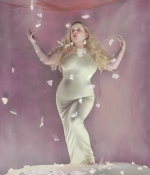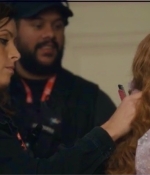Trigger warning: this article contains references to mental illness, including suicidal thoughts and self harm.
The conversation around mental health has never been more prominent, especially on our TV screens. Shows like Sex Education, Normal People, Ginny and Georgia and Euphoria have all tackled the topic, exploring anxiety, depression, self-harm and more. Now, Channel 4 comedy Big Mood is digging deeper, moving past a palatable depiction of mental wellbeing to the messy reality of mental illness.
Starring Nicola Coughlan (Derry Girls, Bridgerton) as playwright Maggie and Lydia West (It’s A Sin) as bar owner Eddie, the six-part series follows these thirty-something best friends as they struggle through life, love and careers that hang in the balance. So far, so relatable, until it becomes clear that Maggie’s mood swings are more than just “a funk” – she has bipolar disorder, and she’s not coping well.
The series opens with an impulsive Maggie begging Eddie to bunk off work to chase after an old teacher – and crush. Maggie is vivacious, confident and hilarious, but makes terrible decisions. As Eddie drops her home after a run-in in the headteacher’s office, she asks whether this could be a manic episode, preparing Maggie for the depressive period that will likely follow. Maggie’s euphoric mood soon drops as she’s stopped taking lithium – the medication that helps to stabilise her moods.
Soon, Maggie is completely make-up free, unwashed with dirty hair. She wears the same underwear for three days in a row – a Friends-themed hen-do T-shirt for longer – and carries armfuls of biscuits and crisps to her unmade bed. This isn’t ‘bed rotting’ as self-care, it’s a total absence of energy to move or nourish herself – a refreshing change from an actor crying quietly under a blanket, surrounded by a few takeaway cartons.
“People say ‘I’m so depressed,’ then have a perfect blow-dry. If I’m gonna look shit, I’m gonna look shiiiiit,” Nicola said at a screening of Big Mood, talking about grounding her portrayal of Maggie in reality. “I really hate vanity on screen. If you’re an actor, you can go to an event and dress up, but on screen you need to get rid of all of that and just play the character how they’re meant to be played, allow it to be ugly and messy,” she continued.
Camilla Whitehill, the show’s writer and creator, added that she specifically scripted that Nicola would be make-up free in these scenes. “It’s great that we’ve encouraged the conversation around depression and anxiety, but there are other mental illnesses whose symptoms might not be as palatable. The symptoms [that are talked about] are very ‘slogan T-shirt’. They never make slogan T-shirts about lithium – rude.”
Big Mood feels revolutionary in getting into the muddle that living with a mental illness can be, diving into topics like medication with nuance. The show is one of the few to have an explicit conversation around pills, addressing the possible side effects of medication like lithium (Maggie reports a dulled, foggy feeling that stops her from writing) alongside the potentially life-saving benefits.
Family, friends and even therapy, while hugely important, is not always enough to support someone living with mental illness. As Maggie has to tell multiple well-intentioned friends at a Love Actually-themed birthday party, she can’t just ‘enjoy herself’ out of a mood disorder. Now having suicidal thoughts, she puts it best when she tells her doctor (played by Sally Phillips) why she’s going back on lithium: “I don’t want to die.”
By this point, Maggie has started self-harming again, her arms covered in plasters. It’s a far cry from other depictions of self-harm on-screen, which can feel overly glamourised (and are always in a bath?). Still, Big Mood doesn’t play up these scenes for impact, instead letting the peeling plasters speak for themselves.
But it’s not just about the physical. Throughout the series, Maggie’s relationship with Eddie becomes incredibly strained. “I fix problems, and you have them,” Eddie says – that is until her own become too big to ignore. Big Mood deftly explores how taxing it can be to support someone with a disorder that makes them self-destructive or unable to support you back. We can’t always drop everything to be by someone’s side, nor might we want to when they don’t seem to want to get better. This is by no means the fault of the person with an illness, yet it’s a tough (and very real) spot to be in.
Then, there’s work. Unable to make any more allowances, Maggie is dumped by her agent and loses her only source of income. Unwashed, unemployed and uncertain if she wants to live, Big Mood certainly portrays a much less pretty version of mental illness, unlike previous examples like Skins and To The Bone, both accused of glamourising similar topics.
Netflix’s 13 Reasons Why also came under fire in 2017 for romanticising suicide as a form of revenge, while 2012 film Silver Linings Playbook seemed to suggest that a new relationship can ‘cure’ depression. Add in the trope that someone with a mental illness is more likely to be violent and dangerous, as seen in Split, American Horror Story and Shutter Island, and it’s clear that these more nuanced portrayals are very needed.
Pop culture can help us feel seen and normalise things that are considered taboo or shameful, which in turn can help people feel confident enough to seek the support they need. It can also help people understand how to help loved ones, whether that’s lending them an ear or encouraging them to see a doctor. Amongst its darkness, Big Mood manages to tackle the tricky topic of mental illness with tact and humour, without an ounce of the gloss that so often does these important storylines a disservice.
As Camilla says, “If we’re gonna open up the conversation about mental health, things should be getting better for the very unwell people in our society that we’re still not helping.” Here’s hoping Big Mood shifts the dial.
Glamour UK
Written by Isabella Silvers
Published March 29, 2024











